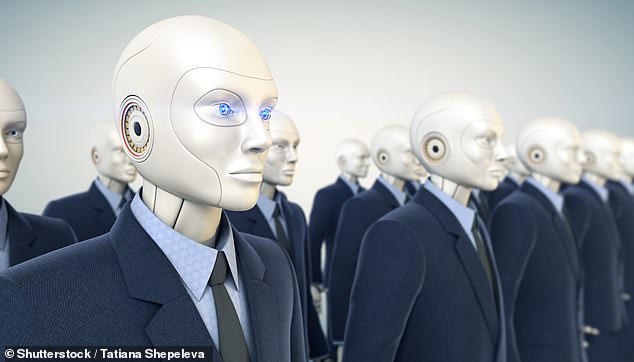Rise of the robot civil servants: AI could take over 8 out of 10 repetitive government jobs, study claims
- At least 120 million tasks within government could potentially be automated
- This would save hundreds of thousands of hours of manual work by human staff
A study shows that artificial intelligence (AI) could take over more than eight in ten repetitive civil servant jobs.
From processing passports to registering to vote, at least 120 million tasks across government have the potential to be automated.
Every minute AI helps save per transaction would save hundreds of thousands of hours of manual work by human staff.
The Alan Turing Institute, which carried out the research, said it would free civil servants from endless bureaucracy and spend more time engaging with the public.
Last month, the Deputy Prime Minister promised that AI would end the “time-wasting, pencil-pushing, computer-says-no” frustrations of dealing with public services.
Artificial intelligence (AI) could take over more than eight in ten repetitive jobs of civil servants, a study shows (stock image)
Oliver Dowden said AI could be a ‘silver bullet’ for the civil service, saving billions of pounds and improving services.
The UK government currently carries out around a billion citizen transactions a year, across 400 services and 57 departments.
Researchers looked at half of these services where there was a decision and exchange of information between an official and a member of the public.
Although these tasks, such as processing benefits or applying for Social Security numbers, are the most time-consuming, they also offer the greatest potential for time savings if automated.
The study estimated that about 84 percent of the 143 million “complex but repetitive transactions” could easily be executed using AI.
Dr. Jonathan Bright, head of AI for public services at the Alan Turing Institute, said: ‘AI has huge potential to help governments become more responsive, efficient and fair.
“Even if AI could save one minute per transaction, that would be the equivalent of hundreds of thousands of labor hours saved every year.
“Achieving responsible and accurate automation with AI will take a lot of work, but the enormous benefit justifies the necessary investment.”

The research estimates that about 84 percent of the 143 million “complex but repetitive transactions” can be easily executed using AI (stock image)
The Alan Turing Institute, which is hosting the annual AIUK event in London this week, said it could “make government services more efficient and citizen-focused, which would increase public satisfaction, cut costs and free up civil servants’ time to focus on other concentrate things’. tasks.
‘Reducing bureaucratic costs and service overheads has been made a priority by many different governments, and many see that AI offers the potential to do this.’
A team of 70 experts from the Cabinet Office are currently exploring ways to use AI to improve public services.
Mr Dowden has stressed that this would not mean ‘real people being replaced by robots’, but that improvements in technology would instead free civil servants to do more important work.
Speaking at Imperial College London, he cited estimates that it could save £24 billion a year, adding: ‘Only through the rapid adoption of AI can we achieve the savings needed to put us on a sustainable path to a smaller state and better state. delivery of services.’
